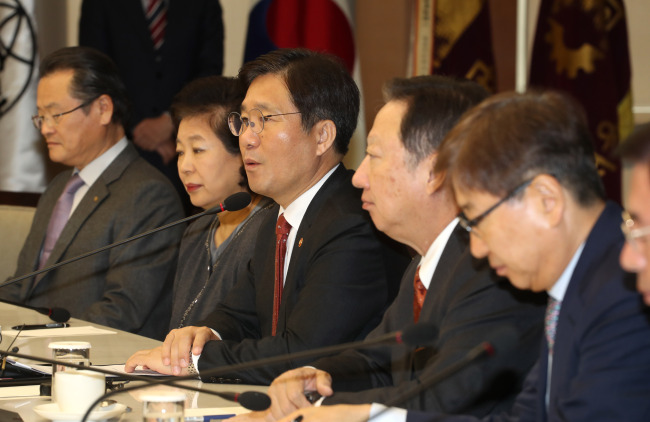South Korean business leaders urged the government to implement drastic deregulation measures to revive the nation’s struggling manufacturing sector, at a meeting with the trade minister on Monday.
“We are (hoping to see) new policy initiatives designed to drive (the nation’s) qualitative growth on the basis of innovation,” said Park Yong-maan, chairman of the Korea Chamber of Commerce and Industry. He said the Moon administration “has been making more efforts than previous governments,” but added that the business community was “not feeling the impact of these reform efforts (in terms of meaningful) deregulation.”
Park, representing the voices of large and small businesses here, urged Trade Minister Sung Yun-mo to retract unnecessary regulations, which he said had hindered companies’ pursuit of innovative ideas and profitable business.
“We are (hoping to see) new policy initiatives designed to drive (the nation’s) qualitative growth on the basis of innovation,” said Park Yong-maan, chairman of the Korea Chamber of Commerce and Industry. He said the Moon administration “has been making more efforts than previous governments,” but added that the business community was “not feeling the impact of these reform efforts (in terms of meaningful) deregulation.”
Park, representing the voices of large and small businesses here, urged Trade Minister Sung Yun-mo to retract unnecessary regulations, which he said had hindered companies’ pursuit of innovative ideas and profitable business.

He was leading a group of CEOs including Park Jin-soo, vice chairman of LG Chem; Yoon Boo-keun, vice chairman of Samsung Electronics; Chung Jin-haeng, president of Hyundai Motor; and Hyun Jeong-eun, chairwoman of Hyundai Group.
The nation’s overseas shipments rely heavily on a thriving chip business, the CEOs argued, saying the export volume of products manufactured by small and medium-sized companies has been declining. New measures are necessary to revive the nation’s ailing shipbuilding, auto and steel industries, they added.
Conceding on the need for deregulation, the trade minister said the government should move away from state-driven initiatives and give greater freedom to businesses to seek innovative ideas.
“I don’t think a state-driven growth strategy would work in the era of the fourth industrial revolution, where creativity and speed are the keys to business success,” Sung said.
“The Commerce Ministry will faithfully play a supporting role for businesses so that they can create more jobs and (provide) more investment.”
The Moon Jae-in government has been pressuring Korean businesses to create jobs. But businesses have been urging the government to eliminate regulatory barriers first, calling them hurdles that impede market entry and growth.
The meeting took place as the nation’s manufacturing sector is struggling as a result of slowing growth. According to Statistics Korea, manufacturing sector output fell sharply in the first nine months of the year, with smaller businesses affected more than big companies.
The factory utilization rate has fallen to the lowest level in the same period since the 1997-98 Asian financial crisis.
The state-run Korea Development Institute last week revised its estimate for 2018 gross domestic product growth from 2.9 percent to 2.7 percent.
By Cho Chung-un (christory@heraldcorp.com)








![[Kim Seong-kon] Democracy and the future of South Korea](http://res.heraldm.com/phpwas/restmb_idxmake.php?idx=644&simg=/content/image/2024/04/16/20240416050802_0.jpg&u=)








![[KH Explains] Hyundai's full hybrid edge to pay off amid slow transition to pure EVs](http://res.heraldm.com/phpwas/restmb_idxmake.php?idx=652&simg=/content/image/2024/04/18/20240418050645_0.jpg&u=20240418181020)

![[Today’s K-pop] Zico drops snippet of collaboration with Jennie](http://res.heraldm.com/phpwas/restmb_idxmake.php?idx=642&simg=/content/image/2024/04/18/20240418050702_0.jpg&u=)